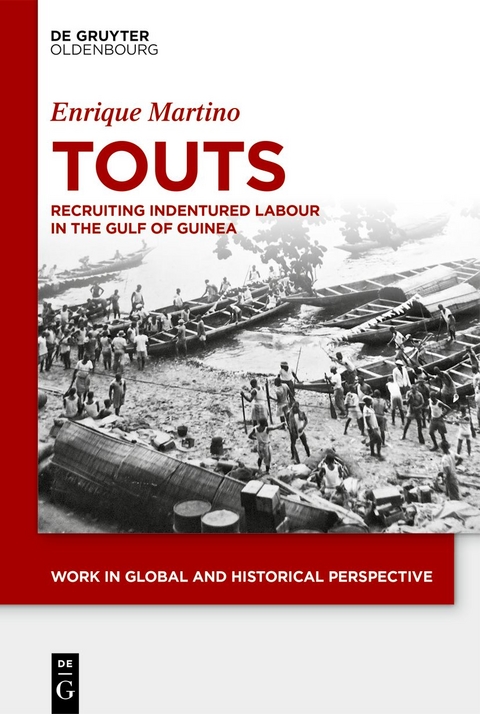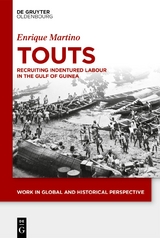Touts
Recruiting Indentured Labor in the Gulf of Guinea
Seiten
2022
De Gruyter Oldenbourg (Verlag)
978-3-11-075464-3 (ISBN)
De Gruyter Oldenbourg (Verlag)
978-3-11-075464-3 (ISBN)
This series will trace at the example of work the historical connections between regions and critically engage with the idea of the North Atlantic World as normal and the rest as exceptional. The aim is to publish studies that change focus back and forth from the intimacy and complexity of relationships in specific places and their connections to distant places and long-term processes of change thereby looking beyond locality and region.
Touts is a historical account of the troubled formation of a colonial labor market in the Gulf of Guinea and a major contribution to the historiography of indentured labor, which has relatively few reference points in Africa. The setting is West Africa’s largest island, Fernando Po or Bioko in today’s Equatorial Guinea, 100 kilometers off the coast of Nigeria. The Spanish ruled this often-ignored island from the mid-nineteenth century until 1968. A booming plantation economy led to the arrival of several hundred thousand West African, principally Nigerian, contract workers on steamships and canoes. In Touts, Enrique Martino traces the confusing transition from slavery to other labor regimes, paying particular attention to the labor brokers and their financial, logistical, and clandestine techniques for bringing workers to the island. Martino combines multi-sited archival research with the concept of touts as "lumpen-brokers" to offer a detailed study of how commercial labor relations could develop, shift and collapse through the recruiters’ own techniques, such as large wage advances and elaborate deceptions. The result is a pathbreaking reconnection of labor mobility, contract law, informal credit structures and exchange practices in African history.
Touts is a historical account of the troubled formation of a colonial labor market in the Gulf of Guinea and a major contribution to the historiography of indentured labor, which has relatively few reference points in Africa. The setting is West Africa’s largest island, Fernando Po or Bioko in today’s Equatorial Guinea, 100 kilometers off the coast of Nigeria. The Spanish ruled this often-ignored island from the mid-nineteenth century until 1968. A booming plantation economy led to the arrival of several hundred thousand West African, principally Nigerian, contract workers on steamships and canoes. In Touts, Enrique Martino traces the confusing transition from slavery to other labor regimes, paying particular attention to the labor brokers and their financial, logistical, and clandestine techniques for bringing workers to the island. Martino combines multi-sited archival research with the concept of touts as "lumpen-brokers" to offer a detailed study of how commercial labor relations could develop, shift and collapse through the recruiters’ own techniques, such as large wage advances and elaborate deceptions. The result is a pathbreaking reconnection of labor mobility, contract law, informal credit structures and exchange practices in African history.
lt;strong>Enrique Martino, Universidad Complutense de Madrid, Spanien.
| Erscheinungsdatum | 10.05.2022 |
|---|---|
| Reihe/Serie | Work in Global and Historical Perspective ; 14 |
| Zusatzinfo | 12 b/w and 2 col. ill. |
| Verlagsort | Basel/Berlin/Boston |
| Sprache | englisch |
| Maße | 155 x 230 mm |
| Gewicht | 536 g |
| Themenwelt | Geschichte ► Teilgebiete der Geschichte ► Kulturgeschichte |
| Schlagworte | Äquatorialguinea • Contract Labour • Equatorial Guinea • free and unfree labour • Golf von Guinea • Nigeria • Plantagenwirtschaft • Sklavenhandel |
| ISBN-10 | 3-11-075464-9 / 3110754649 |
| ISBN-13 | 978-3-11-075464-3 / 9783110754643 |
| Zustand | Neuware |
| Informationen gemäß Produktsicherheitsverordnung (GPSR) | |
| Haben Sie eine Frage zum Produkt? |
Mehr entdecken
aus dem Bereich
aus dem Bereich
der stille Abschied vom bäuerlichen Leben in Deutschland
Buch | Hardcover (2023)
C.H.Beck (Verlag)
CHF 32,15
vom Mittelalter bis zur Gegenwart
Buch | Softcover (2024)
C.H.Beck (Verlag)
CHF 16,80




